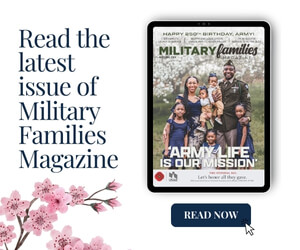I stared at my phone as the likes and comments began to climb. Soon, the connection requests were nonstop and private messages were pouring in. Though there are many who might be feeling excitement during these moments, I was crippled with anxiety and internal feelings of being a fraud.
Who did I think I was? I am not that person who creates posts on LinkedIn or any social platform and suddenly gets a million impressions. A MILLION. Every ding on my phone made my heart beat faster in fear and caused my blood pressure to rise.
After seeing several grumblings in the recent weeks — and I am not going to lie, it’s been a concerning pattern for years — where military spouses online were being attacked for simply sharing they were in fact military spouses. Witnessing this, I became infuriated. I am a veteran, but I am also an active-duty military spouse. When did we begin traumatizing the people who stand beside those who serve? Bullying the ones holding the pieces together so the mission can be fought?
I have worked in the military space for over a decade as a mental health counselor and have provided workshops to thousands of military spouses and service members since 2018. This recent chatter struck an old nerve and I decided to vent my frustrations on my new favorite platform, LinkedIn.
What came after though – I was not expecting.
Initially, I had a few dozen comments when I went to bed but by the time I woke up, I had 600 likes and dozens of comments. I panicked and almost deleted the post, to be completely honest. I began texting friends and asking for advice. I am far from an “influencer” and was afraid I would tarnish the brand I’d been building or business opportunities I’d been working so hard on but, honestly, I was deeply uncomfortable in the sudden spotlight I didn’t ask for.
By midday the attention on my post had risen to several thousand likes or comments. When talking with a fellow military spouse and friend who is active on LinkedIn, she assured me it was going to be OK but encouraged me to add hashtags.
Once I did, my post spiraled out of control – reaching nearly 1 million impressions within the first few days, and I was suddenly fielding messages and requests from some of the military’s top nonprofit and government leaders. What world was I in?
A friend sent me a screenshot showing Gen. Petraeus had “liked” my post. I thought then and there my husband was going to take me to the hospital.
But with the encouragement of friends, I messaged the general, thanking him for his support. He actually connected with me and wrote an incredibly encouraging note back.
With all of this virality and newfound exposure, I have really big fears.
My original message is clearly lost on some because I continued to get thank-you’s for my service.
Don’t get me wrong, thank-you’s are appreciated – but not necessary. In fact, they make me uncomfortable. I was intending to speak to the cultural aspect of what it means to be a military spouse and why it should matter to employers. I wanted to highlight the microaggressions and stigma spouses face daily.
I wanted to be understood, not thanked.
I almost feel as though the figurative snakes are now coming out of the woodworks. I’ve had 100’s of connection requests. Some are genuine and appreciated; but I feel guilty if I don’t answer or respond to everything. As a small business owner now receiving numerous “offers” of support, investment offers and business asks from everyone under the sun, how do I truly know who to trust? Or who is out to chase the shiny coin until it isn’t shiny anymore?
As a mental health advocate, I know this entire thing has affected me emotionally, physically and psychologically. I have been glued to my phone since the post first went out, limiting my normal down time with my family. Plus, there are always the expected but unwanted trolls. While the overwhelming majority of comments were uplifting and supportive, having a few post negative comments had my emotional mind wrestling with the reasonable side of my mind. There’s a tennis match in my head: do not respond, I have to respond – wait – do not respond.
I responded.
It now feels like it’s my job to not only defend my stance but to also stick up for all military families. I also have extreme anxiety and fear about what to post next, I mean how do I even follow up to going viral? What if they hate what I post? Do I talk about my business now? Do I continue to talk about military spouses (why they followed me in the first place)?
I am so nervous because now with all these eyes on me how can I ensure I don’t let other people down?
I am not sure where this whole thing will lead or what the future holds. All I know is that from a person who is not comfortable in the public eye, this has changed my entire perspective on those with a platform. Sure, I give speeches and teach workshops but having your words shared and viewed by a million people is overwhelming.
How do people do this every day?
Moving forward, it is important to me that I continue to balance my advocacy as well as my business while staying completely true to myself.
I know we still have a long way to go to end the stigma and level the field for military spouse employment and programs, but we can’t back down from the fight.
Social media is a powerful tool and is a great way to deliver a message. I was fortunate that my message was supported and well received, mostly. My words are out there, there’s no going back. If I delete it now, there are still screenshots.
The aftermath for me could have been horrible had I not been careful in my choice of words. I think the greatest lesson here is to be intentional in your words, especially when they are posted on the internet. Despite the rollercoaster of emotions this experience generated for me, I wouldn’t change a moment of it (maybe the panic attacks, maybe).
My hope is that it reaches the people who need to hear it and that it will guide me going forward, championing the community I love so much. They’re worth it.
Read comments












































